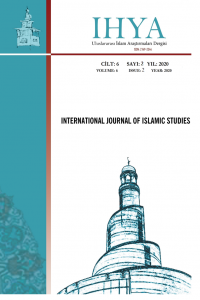Öz
Öz
Arap dilinde kelimeler,
başlarına gelen âmillerin değişmesi sebebiyle sonlarının değişip değişmemesine
göre mu’rab ve mebnî diye iki kısma ayrılır. Mu’rab kelimelerin sonunda,
kelimenin cümle içerisindeki konumuna göre bazı değişiklikler olurken mebnî
olanlar, hiçbir şekilde bu değişikliği kabul etmemektedir. Mebnî kelimeler de,
cümle içerisinde hiçbir şekilde i’râbta yeri olmayan aslî mebnîler ve cümle
içerisinde i’rabta yeri olsa da i’râb alametini kabul etmeyen ârızî mebnîler
şeklinde iki kısma ayrılmaktadır. Harfler, mazi ile emir fiilleri ve cümleler
aslî mebnîler iken zamirler, ism-i mevsûller, ism-i işaretler, fiil isimleri
gibi bazı kelime türleri ise arızî mebnî olan kelimelerdendir. Sürekli olarak
mebnî olan bu kelime türleri dışında altı yön isimleri (cihât-ı sitte) gibi her
zaman olmasa da bazı şartlar dâhilinde bazen mebnî olan kelimeler de
bulunmaktadır.
Arızî mebnî olan kelime
türleri, kimi dilciye göre sadece bir sebepten ötürü mebnîdir ki o da bu
kelimelerin aslî mebnîlerden olan harfe benzemesidir. Buna göre mebnî
kelimeler; harf sayısı, mana, âmil ya da mühmel olup ma’mûl olmama ve mana
ifade etmek için başka bir şeye ihtiyaç duyma gibi hususlarda harfe benzediği
için mebnî olmuştur. Çoğu dilciye göre ise mebnîliğin harfe benzeme dışında,
cümle yerine kullanılmış olma ve mürekkeb olma gibi başka sebepleri de
bulunmaktadır.
Bu çalışmada, Arap dilinde
mebnî olan kelime türleriyle beraber kelimeleri mebnî kılan sebeplerin ne olduğu
konuları ele alınacaktır.
Anahtar Kelimeler: Arap Dili,
Mebnî, Mu’rab, İllet, Harf.
Kaynakça
- Ahmed Muhtar Abdulhamid. el-Bahsu’l-lügavî ʿinde’l-Arab. b.y.: Alemu’l-Kütüb, 2003. Cevherî, İsmail b. Hammâd. “ʿa-r-b”. Mu'cemu's-Sıhâh. Beyrut: Daru’l-Marife, 2012. Esterâbâdî, Radıyyüddîn Muhammed b. Hasan. Şerhu’l-Kâfiye. thk., Yahya Beşir Mısrî. Riyad: Câmiatu’l-İmam Muhammed b. Suûd el-İslamiyye, 1996. Galâyyînî Mustafa. Câmiu’d-durûsi’l-arabiyye. Beyrut: el-Mektebetu’l-Asriyye, 1993. İbn Hişâm, Abdullah Cemaluddin b. Yusuf el-Ensarî. Şerhu Katrin-nedâ ve belli’s-sadâ. thk., Muhammed Muhyiddin Abdulhamid. Beyrut: el-Mektebetu’l-Asriyye, 2010. İbn Hişâm, Abdullah Cemaluddin b. Yusuf el-Ensarî. Şerhu şuzûri’z-zeheb (Mehattâtu rihleti’s-sürûr ile birlikte). Beyrut: Dâru İbn Kesîr, 2013. İbnu’l-Verrâk, Muhammed b. Abdillah. İlelu'n-nahv. thk., Mahmud Câsim Muhammed Dervîş. Riyad: Mektebetu’r-rüşd, 1999. Süyûtî, Celaluddin abdurrahman b. Ebî Bekr. Hem’u’l-hevâmi’ fî şerhi cem’i’l-cevâmi’. thk. Abdulhamid Hindâvî. Mısır: el-Mektebetu’t-Tevfîkiyye, ts. Ukberî, Ebü’l-Bekâ Muhibbüddîn Abdullah b. el-Hüseyn b. Abdullah. el-Lübâb fî İleli’l-binâi ve’l-i’râb. thk. Abdulilah Nebhân. Dımaşk: Dâru’l-fikr, 1995. Zeccâcî, Ebü’l-Kāsım Abdurrahmân b. İshâk en-Nihâvendî. el-Îdâḥ fî ʿileli’n-naḥv. thk. Mâzin el-Mübarek. Beyrut: Dâru’n-Nefâis, 1979. Zemahşerî, Mahmûd b. Ömer b. Muhammed. el-Mufassal fî san’ati’l-i’râb. thk., Ali Bû Melhem. Beyrut: Mektebetu’l-Hilâl, 1993.
Öz
Abstract
In
the Arabic language, words are classified into two parts, such as mu'rab
and mabni, according to whether the endings of words change due to the
change of amil at the beginning of the words. While there are some
changes at the end of mu'rab words depending on the position of the word
in the sentence, mabni words do not accept the change in any way. Mabnî
words are classified into two parts as essential mabnis that have no
place in i'rab in the sentence, and accidental (ârızî) mabnis who
do not accept the sign of i'rab in the sentence even if they have a
place in i'rab in the sentence. While letters, madi, and command verbs
and sentences are essential mabnis, some types of words such as pronouns, ism
mavsul (ism-i mevsul), ism isharah (ism-i işaret), and fi'l nouns
(fiil isim) are accidental words. Apart from these types of words, which are
regarded as permanent, there are some mabni words, not always but in
some circumstances, such as six directions (cihât-ı sitte/ al jihat al
sittah).
The
types of words that are accidental mabni, according to some linguists,
are mabni for only one reason, which is that these words resemble the letter (harf)
that is one of the essential mabnis. Accordingly, mabni words
become mabni because they resemble letters in terms of the number of
letters, meaning, being amil or mohmal (mühmel) but not ma'mul,
being similar to the letter, and demanding something else to express meaning.
According to most linguists, there are other reasons, such as being used as an
alternative to a sentence and being murakkab.
In
this study, the types of words that are mabni in the Arabic language and
the causes make words mabni will be discussed.
Keywords:
Arabic Language, Mabni, Mu’rab, Reason, Letter.
Anahtar Kelimeler
Kaynakça
- Ahmed Muhtar Abdulhamid. el-Bahsu’l-lügavî ʿinde’l-Arab. b.y.: Alemu’l-Kütüb, 2003. Cevherî, İsmail b. Hammâd. “ʿa-r-b”. Mu'cemu's-Sıhâh. Beyrut: Daru’l-Marife, 2012. Esterâbâdî, Radıyyüddîn Muhammed b. Hasan. Şerhu’l-Kâfiye. thk., Yahya Beşir Mısrî. Riyad: Câmiatu’l-İmam Muhammed b. Suûd el-İslamiyye, 1996. Galâyyînî Mustafa. Câmiu’d-durûsi’l-arabiyye. Beyrut: el-Mektebetu’l-Asriyye, 1993. İbn Hişâm, Abdullah Cemaluddin b. Yusuf el-Ensarî. Şerhu Katrin-nedâ ve belli’s-sadâ. thk., Muhammed Muhyiddin Abdulhamid. Beyrut: el-Mektebetu’l-Asriyye, 2010. İbn Hişâm, Abdullah Cemaluddin b. Yusuf el-Ensarî. Şerhu şuzûri’z-zeheb (Mehattâtu rihleti’s-sürûr ile birlikte). Beyrut: Dâru İbn Kesîr, 2013. İbnu’l-Verrâk, Muhammed b. Abdillah. İlelu'n-nahv. thk., Mahmud Câsim Muhammed Dervîş. Riyad: Mektebetu’r-rüşd, 1999. Süyûtî, Celaluddin abdurrahman b. Ebî Bekr. Hem’u’l-hevâmi’ fî şerhi cem’i’l-cevâmi’. thk. Abdulhamid Hindâvî. Mısır: el-Mektebetu’t-Tevfîkiyye, ts. Ukberî, Ebü’l-Bekâ Muhibbüddîn Abdullah b. el-Hüseyn b. Abdullah. el-Lübâb fî İleli’l-binâi ve’l-i’râb. thk. Abdulilah Nebhân. Dımaşk: Dâru’l-fikr, 1995. Zeccâcî, Ebü’l-Kāsım Abdurrahmân b. İshâk en-Nihâvendî. el-Îdâḥ fî ʿileli’n-naḥv. thk. Mâzin el-Mübarek. Beyrut: Dâru’n-Nefâis, 1979. Zemahşerî, Mahmûd b. Ömer b. Muhammed. el-Mufassal fî san’ati’l-i’râb. thk., Ali Bû Melhem. Beyrut: Mektebetu’l-Hilâl, 1993.
Ayrıntılar
| Birincil Dil | Türkçe |
|---|---|
| Bölüm | Makaleler |
| Yazarlar | |
| Yayımlanma Tarihi | 20 Temmuz 2020 |
| Gönderilme Tarihi | 4 Mayıs 2020 |
| Yayımlandığı Sayı | Yıl 2020 Cilt: 6 Sayı: 2 |
İhya Uluslararası İslam Araştırmaları Dergisi, 2017'den bu yana TR DİZİN ULAKBİM tarafından taranmaktadır.
![]()


